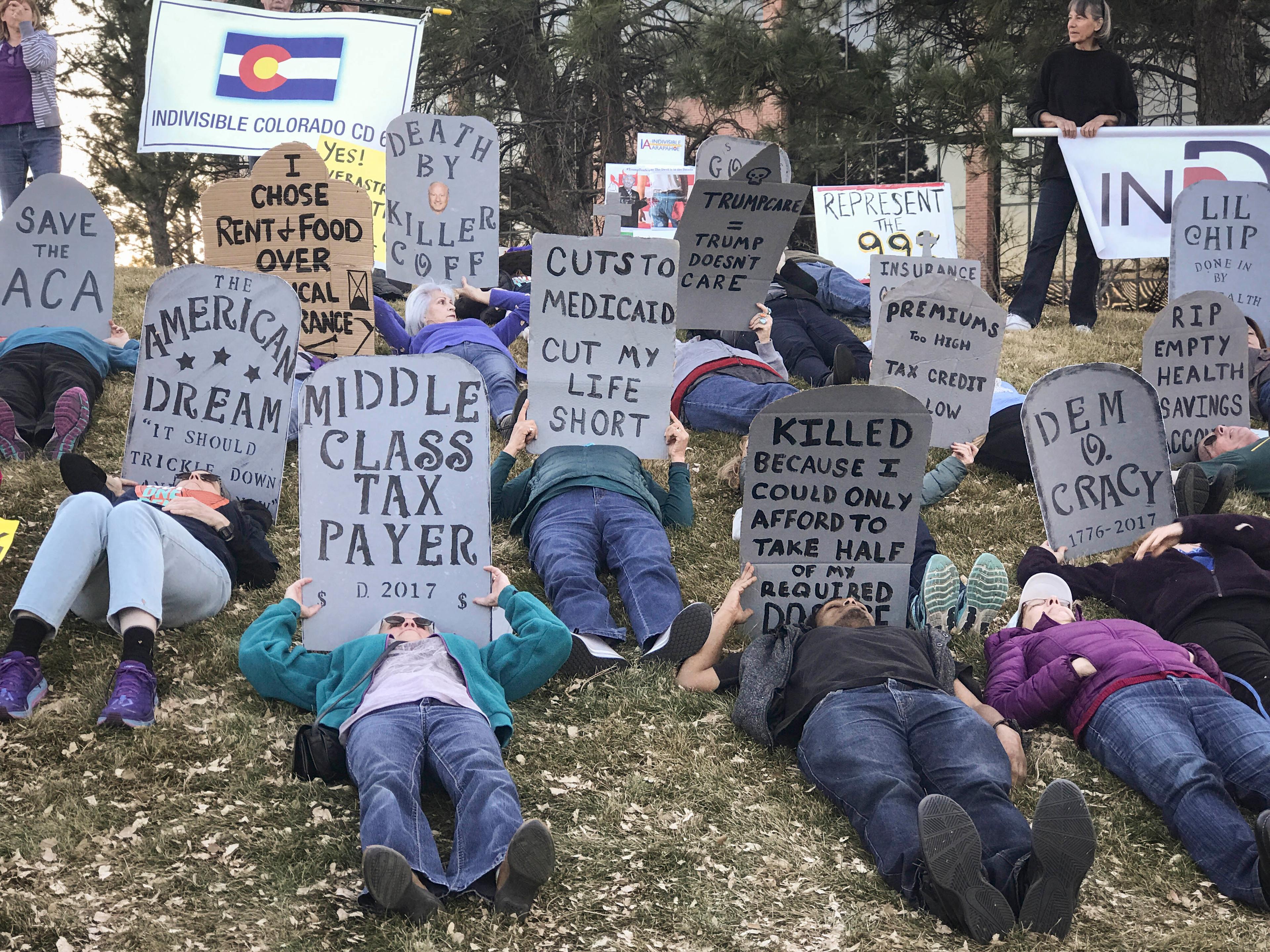

House and Senate Republicans say they’ve reached an agreement on the contents of a tax overhaul package they want to rush to President Donald Trump’s desk as soon as possible. But while the GOP is nearing the votes it needs for passage without support from Democrats, the measure remains divisive, both across the country, and in Colorado.
Republican Rep. Mike Coffman supports the bill. But outside his Aurora office on Wednesday, about 60 or so people were chanting, waving at honking cars, even laying in the grass pretending to be dead next to signs in the shape of tombstones.
The focus of their ire? “This horrible tax bill,” Linda Servey bellowed into a megaphone.
Servey grew up in Denver, has children who are in their 50s and a granddaughter in her 20s, “and not one of us in our extended family is untouched” by the bill, she said. At times she’s worked two or three jobs to get through school and support her family. She's a cancer survivor and her husband is currently battling cancer. She's especially worried about the fate of Medicare.
The Congressional Budget Office said the Republican tax bill would force an immediate $25-billion cut to Medicare — cuts would increase over the next decade — to help offset the estimated $1.4 trillion hit to the federal deficit. Coffman believes economic growth will offset the deficit. But Servey said aging Americans should worry.
At the protest, "You also see people who are in midlife. You see people who are younger, and we all have issues we all need to be here,” she said. “I can't tell you how many homeless people I seen in the last several months who have gray hair. And it's not just from hard life, it's from being elderly. And we don't have the safety net we need.”
While the protesters object generally to the Republican tax bill, the conference committee appears to have addressed at least a few of their concerns.

"I just had to come and have my voice heard, about how this is negatively impacting students," said Regan Byrd. "And it's former current and future students, so is every single body, who can fit under the student demographic is affected."
Byrd objects to several provisions in the House version in particular, including the elimination if the student loan interest deduction and a significant tax increase for many graduate students. It's being reported that the final version will not contain that latter provision.
In Greeley on Wednesday morning, a group of Republicans gathered for their weekly breakfast at a local barbeque joint said there weren’t enough hours in the day to recount their issues with taxation in the country.
"I think Washington, other than defense, could get by with about 75 percent less spending,” said Mel Hilgenberg. As for the current tax regime, “it's just kind of a massive welfare program,” too complicated, and he welcomes Trump working to simplify it. He especially supports the proposed tax cuts for corporations, from 35 to 20 percent.
"You make that kind of reduction, say, on a person that's making him a million dollars a year, and that's a lot of money, that's going to be going to stimulate the economy to create jobs,” he said. But he expressed worry about cuts to Medicare.
"I am very reliant on Medicare and supplemental,” Hilgenberg said. And his doctor has reminded him where money for his health coverage comes from.

“I'm saying, ‘It all ought to be free market and blah blah blah. And Dr. Miller goes, ‘Mel, who's paying for your medical care?’ And it was like the old Gilda Radner thing. ‘Nevermind.’”
In fact, Hilgenberg wants affordable healthcare for everyone. And better roads, better education for children and more. He knows the money has to come from somewhere, but he also believes government spending could be smarter.
Steven Grant, another man at the breakfast table, said the conversations in Washington aren't the right ones.
“We're working on how to change things around on the gathering side, but we're not dealing really effectively with the spending side. And that's where the hard discussions have to happen, and I'm not seeing it happen in DC,” he said. Local communities should take on more responsibility, he believes.
Grant is also suspicious about the tax cuts aimed at the wealthiest Americans assuming that such a move would spur an economy that’s already strong.
“That's a dangerous premise,” he said.









